

 |
Verse 60. Samsara Is Long To The Ignorant
Explanation: To a sleepless person the night is very long. To the weary the league seems quite long. To the ignorant, bereft of an awareness of the Dhamma, the cycle of existence is very long, as he is not aware of how to shorten it. |
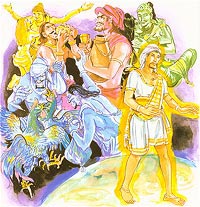 |
Verse 61. Do Not Associate With The Ignorant
Explanation: People need companions. But if one does not find a person who is better than, or at least equal to oneself, it is better to be alone rather than keep company with foolish people. There is no profitable companionship with fools. |
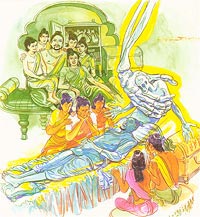 |
Verse 62. Ignorance Brings Suffering
Explanation: The fool worries "I have sons," "I have wealth." When the self is not his own, then how can he claim, "I have sons," "I have wealth"? |
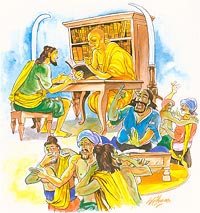 |
Verse 63. Know Reality. Be Wise
Explanation: If a foolish person were to become aware that he is foolish, by virtue of that awareness, he could be described as a wise person. On the other hand, if a foolish person were to think that he is wise, he could be described as a foolish person. |
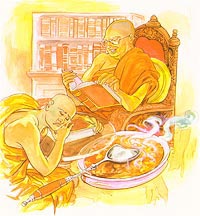 |
Verse 64. The Ignorant Cannot Benefit From The Wise
Explanation: The fool, even if he kept the company of a wise person intimately over a life-time, will not become aware of the nature of experience, just as a spoon will not know the taste of soup. |
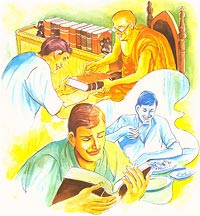 |
Verse 65. Profit From The Wise
Explanation: If a wise person were to associate with a wise person, even for a moment, he will quickly understand the Teaching. This is very much like the tongue being able to discern the subtle flavours of soup. This stanza could be further appreciated when you contrast it with the previous one. In the previous one the image used is the soup. Though it serves tasty food endlessly, it just cannot appreciate how food tastes, very much like a foolish individual being unable to appreciate the teaching even when he keeps company with the wise. An intelligent man, even though he is associated with a wise man only for a moment, quickly understands the Dhamma, just as the tongue knows the taste of soup. |
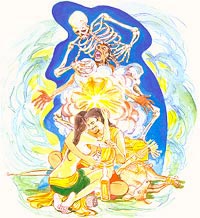 |
Verse 66. A Sinner Is One’s Own Foe
Explanation: Those unwise foolish people behave in a manner that is harmful to themselves. Their sinful actions yield bitter fruit. They are their own enemy. |
 |
Verse 67. Do What Brings Happiness
Explanation: It is good if one were to avoid committing such actions which would later lead to regret. When one regrets one weeps. |
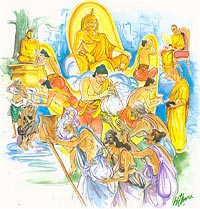 |
Verse 68. Happiness Results From Good Deeds
Explanation: It is good if one were to do such actions that would not bring repentance later. One should do things that bring pleasant consequences. |
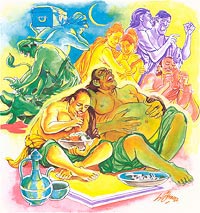 |
Verse 69. Sin Yields Bitter Results
Explanation: When a sinful act is being done, the ignorant person enjoys it as if it were honey. But the suffering comes when it begins to yield its evil results. |
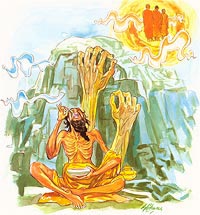 |
Verse 70. The Unconditioned Is The Highest Achievement
Explanation: A foolish person sets out to attain the highest reward of spiritual life. As an austere ascetic, he eats a mere morsel of food with the tip of a blade of grass. And, that too, only once a month. Still that kind of misguided ascetic will not at all be nearer liberation than when he started. With all that, he is not worth even one-sixteenth part of an Arahant who has achieved the Unconditioned. |
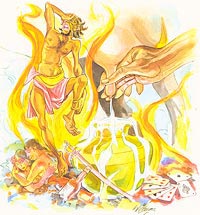 |
Verse 71. Sin Is Like Sparks Of Fire Hidden In Ashes
Explanation: When an ignorance person commits an act of sin, it does not immediately yield bad results. This is like the freshly extracted milk, which does not curdle immediately on being extracted from the cow’s udder. The sin that has been committed remains concealed like the sparks covered with ashes, and continues to follow and burn the doer of sins. |
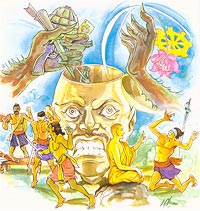 |
Verse 72. The Knowledge Of The Wicked Splits His Head
Explanation: Whatever is learned by the ignorant is conducive to harm. It brings about his own downfall. Misplaced learning destroys whatever potential the learner possesses and renders him useless in terms of real knowledge. |
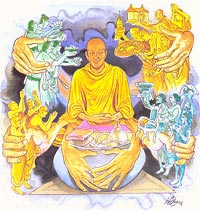 |
Verse 73. Desire For Pre-Eminence
Explanation: He is fond of being recognized for what he, in reality, is not. Yearns for pre-eminence among peers. He craves for preference in matters relating to residences. He is enamoured of the idea of receiving gifts and requisites from other families as well. |
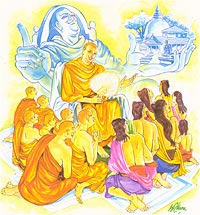 |
Verse 74. The Ignorant are Ego-Centred
Explanation: The ignorant has this attitude of mind: "Let everybody know that this was done by me alone. In whatever activity small or big my leadership shall prevail. Everybody must follow me." This conceit of the ignorant leads to craving, uncontrolled desire and to a groundless pride, to a false sense of superiority. These begin to grow. |
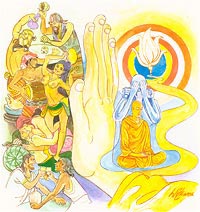 |
Verse 75. Path To Liberation
Explanation: There is one way to worldly and material progress and profit. But the way to Nibbana is quite different than that. The monk, who is the Buddha’s disciple, should be clearly aware of this difference. He must not take delight in the worldly gifts with which he is being enticed. He must on the other hand seek solitude. |
| |
|
|
| |
|
|
| |
|
| |
|
|
|
|
|
|
|